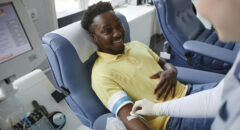
For many people, a cup or two of coffee is a necessary part of how they start their day. The caffeine will definitely wake you up but could this aspect of your daily routine reduce your risk of cancer too? Researchers have been doing the work to find the answer to this very question and give you a whole new reason to reach for your coffee mug.
What The Experts Know So Far
According to a series of recent individual studies, drinking coffee can be linked to a lower risk of developing certain cancers. There is also some good news for people who currently have cancer or are recovering from it. The amount of coffee that made a difference in the risk for the illness varied based on the individual’s health status.
For example, with prostate cancer, it took six cups per day to significantly reduce cancer risk in those who hadn’t had it. In some cases, three cups cut down the likelihood of the more aggressive form of prostate cancer. For those who were recovering from that form of cancer, four cups of coffee per day could prevent its recurrence.
Similar amounts of coffee have also been found to reduce your risk of developing skin, endometrial, throat, liver, and mouth cancers.
Interestingly, the same effects were seen whether the coffee was caffeinated or decaffeinated. That fact strongly suggested that the benefits weren’t linked to caffeine content, which prompted further investigation.
Those studies suggested that the antioxidants in coffee could be the components that have the observed effect on cancer risk because of their anti-inflammatory properties.
They also found two other nutrients known as kahweol acetate and cafestol, that may slow the progression of cancer cells. However, more studies need to be done.
RELATED: That Morning Cup of Coffee May Extend Your Life
The Other Side Of The Coin
Though the findings are promising, it’s important to note that more research needs to be done. The most definitive answers would come from clinical trials and these haven’t been arranged yet.
You should also bear in mind that consuming the amount of caffeine that could reduce the risk of cancer may have consequences. For example, having 32 ounces of coffee daily can give you headaches, dizziness, restlessness, insomnia, and an irregular heartbeat. If you drink too much coffee consistently, you may develop a dependence on it, which in turn leads to a form of withdrawal if you stop.
The symptoms of withdrawal can include headaches, tremors, fatigue, depression, and irritability. Additionally, it isn’t safe for everyone to drink a lot of coffee. Typically, people who are pregnant, are breastfeeding, have sleep disorders, have anxiety, are taking antibiotics, and have digestive issues like GERD should stay away from caffeine.
As noted before, though, it might be possible to achieve the same results with decaffeinated coffee so that’s always an option for you.
RELATED: 8 Ways You Can Prevent Prostate Cancer
Proven Ways To Reduce Your Cancer Risk
There are different things that you can do to reduce your cancer risk. These can differ depending on the type of cancer but some changes are universal.
For example, being physically active and maintaining a healthy diet have been shown to significantly impact your risk level. Staying away from secondhand smoke and quitting if you smoke can reduce your risk of lung cancer whereas protecting your skin from the sun is likely to prevent skin cancer.
It’s also a good idea to get checked out regularly because there are genetic factors that will impact your risk of developing cancer. The frequency with which you need to be screened can be influenced by your age, medical history, and current lifestyle. You should talk to your doctor about what specific schedule will work for you.
Unless you have a sensitivity to caffeine or have a condition that limits how much of it you should have, coffee can be an easy way to manage your risk of developing cancer. If you’re drinking more than a cup per day, however, make sure to talk to your doctor. You should also avoid the habits that increase your cancer risks and attend scheduled screenings.








